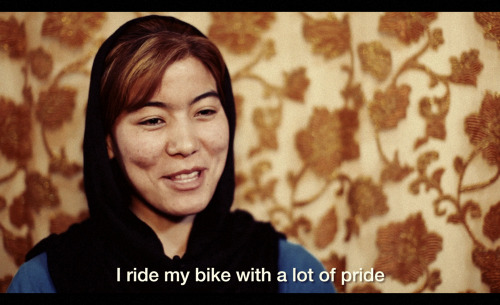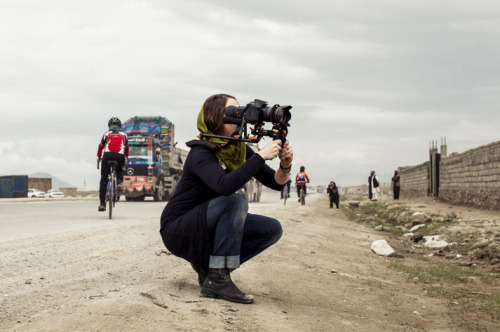Afghan Cycles by Ana V. Francés “The bicycle has done more to emancipate women than
Afghan Cycles by Ana V. Francés “The bicycle has done more to emancipate women than anything else in the world. It gives a woman a feeling of freedom and self-reliance. The moment she takes her seat she knows she can’t get into harm unless she gets off her bicycle, and away she goes, the picture of free, untrammeled womanhood.” - Susan B. Anthony The following answers are a collaboration from the Afghan Cycles film crew including: Sarah Menzies - Director, Whitney Conner Clapper - Co-Director + Producer, Shannon Galpin - Producer and Non-Profit Partner/Mountain2Mountain. 1. Tell us about the project: Afghan Cycles is a documentary film about the Women’s National Cycling Team of Afghanistan. We follow the girls from their daily lives to training, telling the story of what it means to be a female cyclist in an otherwise oppressive country. 2. where do the idea of the documentary come from? Shannon approached me last winter to tell me about the women’s team that was taking shape in Afghanistan. I have known Shannon for years now, and have been inspired by her work in Afghanistan from the moment I met her. She was the first woman to mountain bike in Afghanistan, so when she discovered that a woman’s cycling team was forming, I could tell she was excited to tell the story. She came to me with the idea of making a film about them, and I was on board immediately. The structure of the film has evolved and changed shapes in a lot of ways. After meeting the girls, we quickly realized how important this story was, and it wasn’t just about the cycling team. It’s also about the social and cultural taboos that these women are challenging by riding the bike. 3. why girls? why bikes? Participating in sport gives individuals something to passionate about, and it allows them to be a part of cohesive team. For women in an oppressive county, that team dynamic and passion for sport can be incredibly empowering. Our story is about how the bicycle achieves this, and we see the metaphor of “pedaling a revolution” applying directly with this team of women who are challenging gender barriers. The bicycle played a big role in the Women’s Suffrage Movement in the States, and we see a lot of parallels between that time in our history, and the women on the cycling team in Afghanistan. There are more girls joining sports teams in Afghanistan everyday - boxing, basketball, volleyball, even skateboarding. The bike has long since been a symbol of freedom for women, most notably during the women’s suffrage movement in the United States in the early 1900’s. The activist Susan B Anthony famously quoted that nothing was more important for women than bikes in the fight for equality. Around the world today, the bike is a vehicle for social justice and change… used to help combat gender violence in rural communities, increase access to education and healthcare, and to provide cheap transportation alternatives. In Afghanistan, riding bikes for women is still seen as culturally offensive and revolutionary. Women have never rode bikes in Afghanistan and finally seeing young women ride bikes in the post-Taliban era is thrilling and inspiring, and sign of change to come. 4. why Afghanistan? what was your initial motivation to go there? I (Shannon) first traveled to Afghanistan in 2008, to start her work with women’s rights and gender equity in what is repeatedly ranked, the worst country in the world to be a woman. She wanted to find unique ways to work on behalf of women and girls, and over the past 15 visits, she had been inspired by the resiliency and strength of the women and girls that prove their worth every day in a culture that places little value on the lives of women. The concept of using the bicycle as a metaphor to “pedal a revolution” is a universal theme. Our ultimate goal with the film is to get more women on bikes, but we’re focusing on the Afghan team because they live in one of the hardest places in the world to be a woman. Documenting the progress and success of this team will show women internationally that riding bikes can be possible for women everywhere. 5. How’s the feedback with the locals? In your time in Afghanistan, did you ever face a lot of opposition from the people of Kabul? My interactions with Afghans has been 99% positive. Its a difficult place for women to work, its an even more difficult place for women to live. Women have found their voice and are integrated into every aspect of Afghan society in urban areas like Kabul. Educated Afghan men and boys value the role of women in society and are moving towards a more equal society, but the majority of Afghanistan is rural and uneducated and that creates a country with a wide spectrum of values and expectations. The fact remains that this is still one of the most oppressive countries to be a woman, the Taliban are in control of many parts of the country, and women have to fight for their rights every step of the way. The women that ride their bikes are taking risks that we would never expect to face in the West just to pedal a bicycle. But they do this to express their rights, the normalcy of riding of a bike, and to challenge the gender norms. That doesn’t happen without ruffling a few feathers. Having said that, our time in Kabul was amazing. Everyone we met was so hospitable and interested in what we were doing. There were certainly the times where your heart starts beating a little bit faster though - we were an all female crew filming an all female cycling team. Knowing that the team has been threatened in the past, we felt a bit vulnerable a handful of times. But our experience was incredibly hospitable. People always wanted to know more about what we were doing. We had incredible access with support from the local police chief and Province Governors. 6. Any story that touched you particularly? It’s difficult to say that one story touched me anymore than another story. With each of the girls, there was always that moment where we could feel them trust us wholeheartedly. It came in different forms for each of them, but when that shift happened through smiles, hand gestures, and broken English, it was always so special to me. In the beginning, we were total strangers, so asking them to open up to us about such taboo topics was a lot for them. When those walls fell and we connected on what felt like a deep and respectful level, as a documentary filmmaker, that’s always a really special moment. “Photo by - Claudia Lopez Photography” “Film shots from the documental” www.afghancycles.com -- source link
Tumblr Blog : girlsonwheelsmag.tumblr.com
#afghan cycles#documentary#afghanistan#revolution#cyclist#roadtrip#roadmovie









